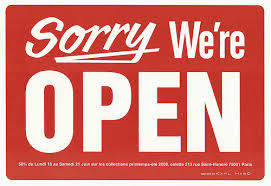 The central argument of my new book, OPEN: How We’ll Work, Live And Learn In The Future, is that the same forces that have seen a revolution in how we interact with each other socially, will force us to change every aspect of how we do business. It’s not a question of if we go open, but when, and how quickly we can adapt to it.
The central argument of my new book, OPEN: How We’ll Work, Live And Learn In The Future, is that the same forces that have seen a revolution in how we interact with each other socially, will force us to change every aspect of how we do business. It’s not a question of if we go open, but when, and how quickly we can adapt to it.
Organisations are seeing record levels of disengagement – fewer than 11% of us say we are engaged in our work. This waste of human potential has dramatic financial consequences too: disengagement comes at an annual cost of $300bn, in the US alone.
A key reason for employee disengagement is that the openness and autonomy we experience when we’re not at work is absent in all but the most successful companies. It’s no coincidence that Google is considered to be the most innovative company and the best company to work for: engagement is a pre-requisite for creativity.
I describe the sea-change in the past 10 years as the world becoming SOFT. Technology has enabled four behaviours, values and actions in the social space – Sharing, Open, Free, Trust – most organisations continue to struggle to bring these values to the working environment.
Sharing: Social media has transformed how we share knowledge and ideas – yet many organisations discourage, or even ban, its use in the workplace. The vice-president of Google Enterprise, Sebastien Marotte says “Over the next decade, the process of sharing and developing ideas will be dramatically accelerated by the advance of relatively young technologies having a major impact on the way products and services are brought to market….For most people, communicating and collaborating in an online world have become the norm .. For many of us though, cooperating this smoothly in our professional lives is more of an ideal than a reality.”
Open: Not all organisations can practice the radical transparency that helped zappos.com build $2bn worth of customer loyalty in ten years, but organisations that continue to practice ‘command and control’ are facing imminent extinction because we, as consumers and employees, won’t stand for it any more.
Free: 3M has created 50,000 product lines through practising two crucial freedoms: the freedom to fail (over half of 3M’s inventions don’t get to production) and the freedom to ‘tinker’. Although now much-copied, 3M pioneered the introduction of 15% ‘free time’ for all staff in 1948. If you’re not sure how to build a culture of autonomy in your organisation, try following WD40’s CEO, Garry Ridge, in replacing the reporting of failure with that of a ‘learning moment’.
Trust: Best Buy’s introduction of a ‘Results Only Work Environment’, where employees could decide where, when, and for how long they worked (so long as personal targets were met) could have been seen as asking for trouble. Surely workers would abuse this trust in them? In fact, the reverse happened: productivity went up by 21% in a single year, and employee engagement also rose by 19%. Similarly the video games maker, Valve, doesn’t assign work to employees. Instead, their ‘pick your own project’ approach to management has made them one of the most productive companies in the world: 300 employees, working without a boss, in a company valued at $3 billion.
These highly innovative organisations have become leaders in their field because they’ve learned a number of key lessons:
- People are at their most productive when they see their employment as less like ‘work’ and more like learning – why else would Google call their HQ ‘the campus’?
- it’s not enough to become a social business – you have to understand how your customers learn socially, and then adopt those values, behaviours and actions
- Opening up your business pays dividends. Knowledge as intellectual property has little value – knowledge, as the key to opening up collaboration, is priceless
Governments, businesses and social institutions alike are finding that going open is inevitable. As Google recently said:”Our goal is to make open the default. People will gravitate towards it, then they will expect and demand it and be furious when they don’t get it. When open is intuitive, then we have succeeded…..Open will win.”

Open Source communities demonstrated the power of free and open well before social media became popular. Indeed a lot of social media principles can be traced to the mailing lists and community forums used by open source communities to manage their projects. In the end water flows down hill and so business models that reduce costs are likely to survive and that applies to commercial, voluntary or community business.